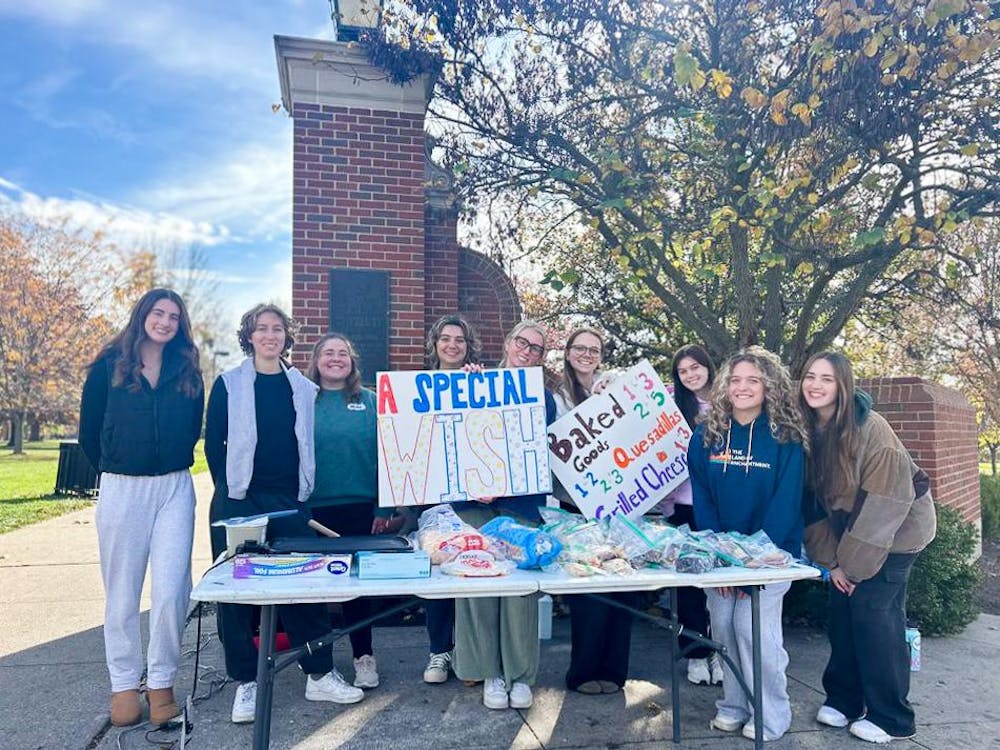Mark Pukita, a candidate for U.S. Senate, visited Oxford last week to discuss COVID-19 vaccination exemptions and mandates.
The event, which took place on Sept. 29 at Top Deck, included a testimonial from a Miami University parent about the vaccine mandate and a review of the legality of vaccination mandates from a Cincinnati lawyer.
This is Pukita’s second time coming to Oxford on his campaign trail. He first came to Oxford in August to discuss Miami's mask and vaccination policy. Pukita’s campaign focuses on “instilling solid values in education,” which prompted him to return to Oxford to better inform students about vaccination exemptions.
“We were down here in August about the mask and vaccine mandates … so it’s just following in that vein,” Pukita said.
Pukita, a constitutional conservative, said he isn’t against the COVID-19 vaccination, but rather wants people to have a choice.
“I’m not anti-vax, [and] I’m not anti-mask. I’m not anti-anything,” Pukita said. “What I am is for someone to have a choice as to whether they want a mask or vaccine, not for it to be mandated.”
Pukita did not address the legality of vaccine mandates, but Matt Miller-Novak, a Cincinnati attorney, discussed the authority behind vaccine exemptions and mandates.
Miller-Novak is a partner of the Barron, Peck, Bennie and Schlemmer Co. LPA. He has been practicing law for just less than twenty years and specializes in employment discrimination, business litigation and government transparency.
According to Miller-Novak, private employers and state governments can mandate vaccinations; however, there are exemptions.
He explained there are two primary exemptions that people rely on for vaccines. These include the American with Disabilities Act (ADA) and Title VII. Title VII covers discrimination based on religion, race, gender and national origin.
Under the ADA, exemptions are distributed on a case-by-case basis. Vaccination exemptions are also served under Title VII, however, religion can not be used as an exemption in some cases.
Miller-Novak also discussed a new state legislature statute, which prohibits public schools and institutions of higher education from requiring an individual to get a vaccine that the Food and Drug Administration (FDA) has not approved. It also prohibits public schools and institutions of higher education from discriminating against an individual who has not received a vaccine.
Enjoy what you're reading?
Signup for our newsletter
The statute will go into effect on Oct. 13.
“I think [the statute] is a very political way to say that you probably can’t have a vaccine mandate, or you can have one but you can’t enforce it,” Miller-Novak said.
Chris Hicks, a Miami alumnus and parent, also spoke at the event. Although his son is vaccinated, he looked into the vaccination exemption process out of curiosity.
Students must complete a brief education module before they access the exemption form, but Hicks tried to bypass the module with his parent login. However, Hicks was unable to see the educational module and the exemption form.
This confused Hicks because the form for other vaccination exemptions can be easily found online.
“This is morally and ethically wrong to be hiding these things from parents, to be hiding them from the general community, to not make them available,” Hicks said.
Hicks also referenced the new statute and said he feels that Miami may be wasting time and effort implementing a mandate that will need to be adjusted.
“You have universities out there putting vaccine mandates in place, and there’s a statute taking effect two days before the [vaccine] mandate goes into Miami that would appear to block the mandate,” Hicks said.
Constitutional conservatives Ricky and Kathy Geething drove about three-and-a-half hours to hear Pukita speak. They came to the event to learn more about the extent to which employers can mandate vaccinations.
“Ourselves and a lot of the people we know are concerned about losing their jobs with the vaccine mandate, so we wanted to come and see what we could do,” Kathy said. “A lot of people are afraid that they aren’t going to be able to keep their jobs.”
Kim Draginoff, a Miami parent, was attending the lecture to learn more about the exemption process, not only for students but for employees as well.
Draginoff’s son filed a religious exemption which was approved through the university.
Currently, Draginoff’s employer does not require the vaccine, but she's worried that the government might mandate it.
“It depends on if the President’s agenda goes through or not,” Draginoff said. “I don’t think [my job] would on their own, but if they're forced to, they might have to.”
Miller-Novak closed the talk by warning about misinformation in the media. He hopes that people take the information presented to make informed decisions about the vaccine.
“I think objective information is important to dictate your decision,” Miller-Novak said. “It’s a public service thing for me to teach people the answers they need to know rather than the ones they want to hear.”




